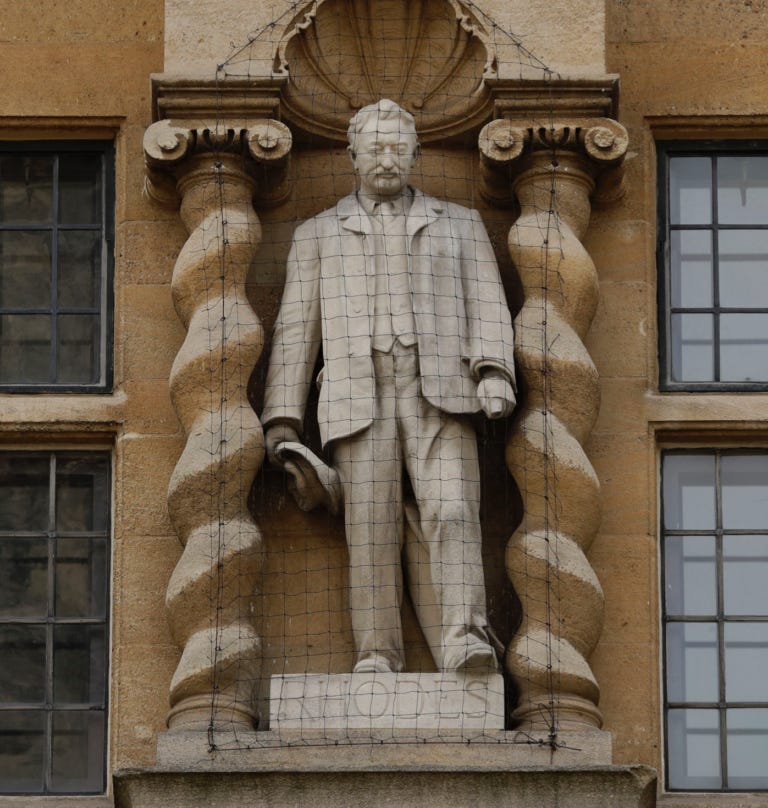According to the introduction to an important interview conducted by respected writer and editor Peter Shawn Taylor:
Late in life, Nigerian novelist Chinua Achebe was asked if his view of colonialism had changed in the half-century since he wrote Things Fall Apart, his famous first novel critical of British rule. “The legacy of colonialism is not a simple one,” he replied, “but one of great complexity with contradictions – good things as well as bad.” Today our understanding of that complexity is rapidly being obliterated as governments, universities and museums race to “decolonize” their institutions and make colonialism synonymous with racism, violence and exploitation. In his controversial new book Colonialism: A Moral Reckoning, British ethicist Nigel Biggar seeks to revive the notion that the British Empire contained “good things as well as bad.” The Scottish-born Biggar recently connected with Peter Shawn Taylor to discuss the morality of empire, Canada’s own colonial legacy and how it feels to be named an “honorary” Courageous Canadian.
Taylor went on to say:
“Technically, Nigel Biggar is Regius Professor Emeritus of Moral and Pastoral Theology at the University of Oxford, and director of the school’s McDonald Centre for Theology, Ethics, and Public Life. But these days he’s likely better known throughout Britain as that bloke who claims the British Empire wasn’t as bad as all that.
“Biggar’s heterodox views on his country’s imperial record first came to public prominence during his defence of a statue of arch-colonialist Cecil Rhodes on Oxford’s campus in 2016. The #RhodesMustFall campaign demanded its removal on the grounds that Rhodes – founder of the DeBeers diamond empire, prime minister of South Africa’s Cape Colony and benefactor of the renowned Rhodes Scholarships – was a racist murderer on par with Adolf Hitler. Biggar retorted that history is full of complexities and nuance. “We ought to tolerate the public celebration of morally ambiguous heroes,” he wrote, rubbishing the idea that Rhodes was analogous to Hitler – the colour-blind nature of his famous scholarship program being sufficient proof of that. In bringing historical facts to bear on the issue, Biggar pointedly noted that a crucial quotation used to pin racism on Rhodes was actually fabricated by his detractors. The Rhodes statue still stands at Oxford.
“A year later, in a provocative column in The Times entitled, “Don’t feel guilty about our colonial history” Biggar argued that Britons ought to consider adding a dash of pride to any feelings of shame about their past. He counted public order, good governance and putting an end to the Trans-Atlantic slave trade among colonialism’s greatest achievements, while admitting to its low points as well. Biggar’s balanced approach immediately brought him in conflict with the prevailing doctrine of “decolonization,” which considers European colonialism to have always and everywhere been an unmitigated evil. An open letter from outraged colleagues at Oxford decried his position as “nonsense” and “breathtakingly politically naïve.”

“Biggar’s efforts at promoting an alternative view of imperial history nonetheless earned the attention of publisher Bloomsbury, which offered him a book contract in 2018. But after he delivered a manuscript and was told it was a work of “major importance,” the publisher informed him via email that public feelings were “not currently favourable” for his controversial views and cancelled the book.
“Stifling debate by cancelling or refusing to acknowledge heretical views has become worrisomely common throughout the academic world, especially in regards to colonial studies. An earlier peer-reviewed article by Portland State University’s Bruce Gilley, entitled “The Case for Colonialism,” which Biggar has cited as an inspiration for his own work, was later withdrawn following threats of violence against the journal’s editor.

“Biggar’s cancellation proved only temporary, however. Publisher William Collins subsequently took up the project and Colonialism: A Moral Reckoning was released in the UK in February. As might be expected, reviews have been mixed. And often angry. The Economist tendentiously claimed the British Empire deserved little credit for stopping the slave trade and therefore had nothing to brag about. The Guardian declared that his attempts at emphasizing colonialism’s positive aspects “strain credulity.” Yet Biggar seems have found an audience eager to learn more about their colonial past, as sales have reportedly been brisk. The book will be released in North America on May 5.”
Biggar recently sat down via Zoom with Peter Shawn Taylor to discuss his new book, a work highly relevant to Canada’s colonial history and contempory Crown-Indigenous relations, and the controversies it has triggered.
The outstanding contents of their conversation may be read on the other side of the paywall.
Keep reading with a 7-day free trial
Subscribe to REAL Indigenous Report to keep reading this post and get 7 days of free access to the full post archives.



